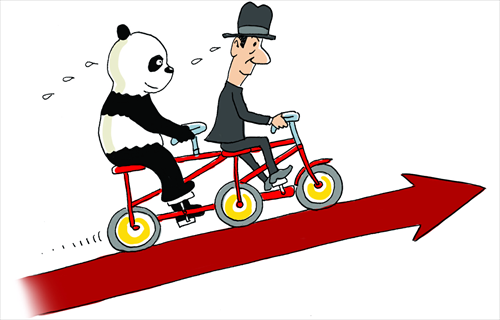UK, China explore new complementarities

Illustration: Liu Rui/GT
Chinese President Xi Jinping's five-day state visit to the UK starting from Monday corresponds with the commencement of the second decade of the Sino-UK comprehensive strategic partnership. This is also the first-ever official visit to the UK by a Chinese head of state in 10 years.
The UK is the only destination on Xi's itinerary this time. Xi took a one-stop trip to Russia to attend the opening ceremony of the 2014 Winter Olympic Games in Sochi in February 2014 and to South Korea and Mongolia respectively in July and August. It is understandable that he made exclusive journeys to countries that are important neighbors of China. The diplomatic arrangement of this UK trip oceans away illustrates the significance of Beijing's construction of a global partnership network.
The UK is a core member state of the developed Western club and the EU as well as an ally boasting a "special relationship" with the US. Though its splendor as the empire on which the sun never sets has faded away, it remains an important player on the international political stage with its prominent economic, trading, technological, financial and innovation power and booming cultural influence. In addition, it continues to play a unique role in international affairs via the Commonwealth of Nations composed of more than 50 members.
The British government is seeking to get closer to the rising country in recent years. After being re-elected as UK prime minister in May, David Cameron expressed his expectation to forge a "golden era" in the two nations' relations within the next five years.
Though China has been experiencing a slowdown in economic growth over the past few years, the UK remains sanguine about its development prospects and suggests it seize the opportunities during China's economic transformation process.
According to Martin Jacques, a senior research fellow from Cambridge University, the West should refrain from developing a bearish view of China because the economic slowdown is triggered by a "deeper structural shift," and China has actually witnessed an increasing share of services in its GDP and "employment has remained buoyant." While some Western countries are preoccupied with Beijing's dropping GDP growth, the more seasoned British see a much larger picture.
Intensifying ties with the UK is of great significance to accelerating China's diplomatic transition.
First, it helps Beijing pursue new ways to establish win-win cooperation with developed nations. The Cameron administration has introduced a massive plan to revitalize the north of England, which, he hopes, can get investment from China.
Chinese corporations' participation in the UK's programs of high-speed rail and nuclear power plants has a far-reaching influence beyond the economic sphere, demonstrating that China and developed countries can explore fresh complementarities in their economic growth. Besides, the two sides will join hands to expand cooperation in a third country.
Internationalization of the yuan has brought about a critical opportunity for the development of Sino-UK ties. Though the UK lost global hegemony after WWII and was later replaced by the US, it still holds a crucial position in the international financial system. Now the country is urgently seeking to promote London as an offshore yuan trading center so as to strengthen its status as a global financial center.
In April, the UK was among the first to become a founding member of the Asian Infrastructure Investment Bank and spurred other European countries including Germany and France to join the China-led mechanism regardless of Washington's repeated objections. This has greatly encouraged China to set up a new type of international financial institution.
Deepening cooperation between China and the UK in international affairs conforms to their long-term interests. As a permanent member state of the UN Security Council, the UK is not only a direct participant in tackling plenty of international hotspot issues, but also an important player in various fields such as international development aid, trading rule-making, counter-terrorism and climate change.
In recent years, China and the UK have also scaled up policy coordination in handling the Iran nuclear issue and facilitated the accomplishment of the agreement, which is definitely inspiring. Meanwhile, London is also boasting an increasingly essential role in propelling China-Europe ties.
In line with China's WTO accession agreement, it will gain the market economy status by the end of 2016, which is of enormous importance to helping Chinese firms avoid improper anti-dumping investigations and other discriminative treatment by the West. Nonetheless, many Americans and Europeans are reluctant to give China a green light.
The UK can help dampen this kind of trade protectionism and push ahead with a healthy Sino-European trading relationship.
China will host the G20 summit next year, so it is imperative to exchange ideas with the UK on restructuring and macroeconomic policy coordination.
Cementing multi-faceted ties with China and taking a free ride on its unprecedented development has found a wide consensus among British public opinion. Regaining its great power clout by strengthening ties with Beijing is a smart move by London. At the same time, the UK can serve as a lynchpin in China's foreign policy.
With Xi's historic trip, it is high time that the two nations develop a "special relationship."
The author is a research fellow at the Charhar Institute and an adjunct fellow at the Chongyang Institute for Financial Studies at Renmin University of China. opinion@globaltimes.com.cn
Read more in Special Coverage: